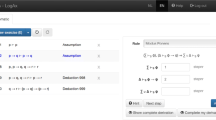Abstract
When mathematicians present proofs they usually adapt their explanations to their didactic goals and to the (assumed) knowledge of their addressees. Modern automated theorem provers, in contrast, present proofs usually at a fixed level of detail (also called granularity). Often these presentations are neither intended nor suitable for human use. A challenge therefore is to develop user- and goal-adaptive proof presentation techniques that obey common mathematical practice. We present a flexible and adaptive approach to proof presentation based on classification. Expert knowledge for the classification task can be hand-authored or extracted from annotated proof examples via machine learning techniques. The obtained models are employed for the automated generation of further proofs at an adapted level of granularity.
This work was supported by a grant from Studienstiftung des Deutschen Volkes e.V.
Preview
Unable to display preview. Download preview PDF.
Similar content being viewed by others
References
Bartle, R.G., Sherbert, D.: Introduction to Real Analysis, 2nd edn. Wiley, Chichester (1982)
Benzmüller, C., Horacek, H., Kruijff-Korbayová, I., Pinkal, M., Siekmann, J.H., Wolska, M.: Natural language dialog with a tutor system for mathematical proofs. In: Lu, R., Siekmann, J.H., Ullrich, C. (eds.) Cognitive Systems: Joint Chinese-German Workshop. LNCS (LNAI), vol. 4429, pp. 1–14. Springer, Heidelberg (2007)
Benzmüller, C., Horacek, H., Lesourd, H., Kruijff-Korbayová, I., Schiller, M., Wolska, M.: A corpus of tutorial dialogs on theorem proving; the influence of the presentation of the study-material. In: Proc. Intl. Conference on Language Resources and Evaluation (LREC 2006), Genoa, Italy, ELDA (2006)
Autexier, S., Benzmüller, C., Dietrich, D., Meier, A., Wirth, C.P.: A generic modular data structure for proof attempts alternating on ideas and granularity. In: [14], pp. 126–142
Fiedler, A.: P.rex: An interactive proof explainer. In: Goré, R.P., Leitsch, A., Nipkow, T. (eds.) IJCAR 2001. LNCS (LNAI), vol. 2083, pp. 416–420. Springer, Heidelberg (2001)
Denney, E., Power, J., Tourlas, K.: Hiproofs: A hierarchical notion of proof tree. In: Proc. of the 21st Annual Conf. on Mathematical Foundations of Progamming Semantics (MFPS XXI). ENTCS, vol. 155, pp. 341–359. Elsevier, Amsterdam (2006)
Autexier, S., Fiedler, A.: Textbook proofs meet formal logic - the problem of underspecification and granularity. In: [14], pp. 96–110
Quinlan, J.R.: C4.5: Programs for Machine Learning. Morgan Kaufmann, San Francisco (1993)
Schiller, M., Benzmüller, C.: Granularity-adaptive proof presentation. Technical report, SEKI Working-Paper (2009), http://arxiv.org/pdf/0903.0314v4
Frank, E., Witten, I.H.: Generating accurate rule sets without global optimization. In: Proc. 15th Intl. Conf. on Machine Learning, pp. 144–151. Morgan Kaufmann, San Francisco (1998)
Platt, J.C.: Fast training of support vector machines using sequential minimal optimization. In: Schoelkopf, B., Burges, C., Smola, A. (eds.) Advances in Kernel Methods - Support Vector Learning, pp. 185–208. MIT Press, Cambridge (1998)
Hobbs, J.R.: Granularity. In: Joshi, A.K. (ed.) Proc. of the 9th Int. Joint Conf. on Artificial Intelligence (IJCAI), pp. 432–435. Morgan Kaufmann, San Francisco (1985)
McCalla, G., Greer, J., Barrie, B., Pospisil, P.: Granularity hierarchies. In: Computers & Mathematics with Applications, vol. 23(2-5), pp. 363–375. Elsevier, Amsterdam (1992)
Kohlhase, M. (ed.): MKM 2005. LNCS (LNAI), vol. 3863. Springer, Heidelberg (2006)
Author information
Authors and Affiliations
Editor information
Editors and Affiliations
Rights and permissions
Copyright information
© 2009 Springer-Verlag Berlin Heidelberg
About this paper
Cite this paper
Schiller, M., Benzmüller, C. (2009). Presenting Proofs with Adapted Granularity. In: Mertsching, B., Hund, M., Aziz, Z. (eds) KI 2009: Advances in Artificial Intelligence. KI 2009. Lecture Notes in Computer Science(), vol 5803. Springer, Berlin, Heidelberg. https://doi.org/10.1007/978-3-642-04617-9_37
Download citation
DOI: https://doi.org/10.1007/978-3-642-04617-9_37
Publisher Name: Springer, Berlin, Heidelberg
Print ISBN: 978-3-642-04616-2
Online ISBN: 978-3-642-04617-9
eBook Packages: Computer ScienceComputer Science (R0)




